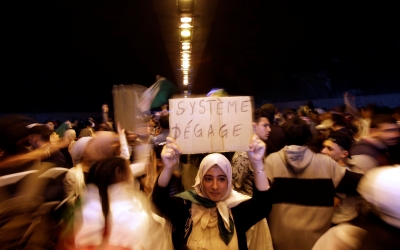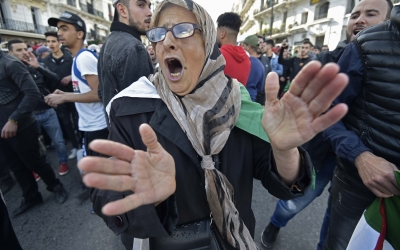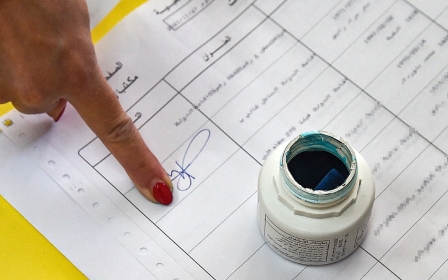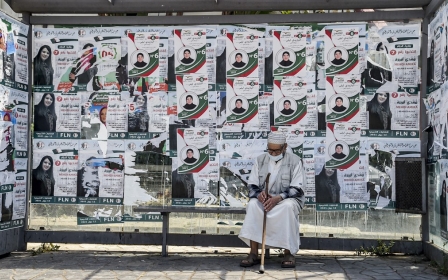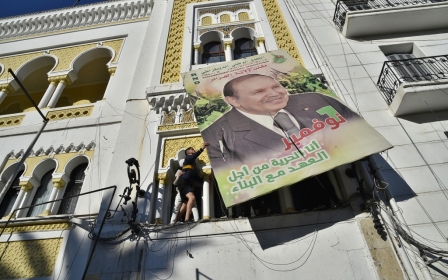Algeria election: A foregone conclusion with the president’s rivals on the sidelines
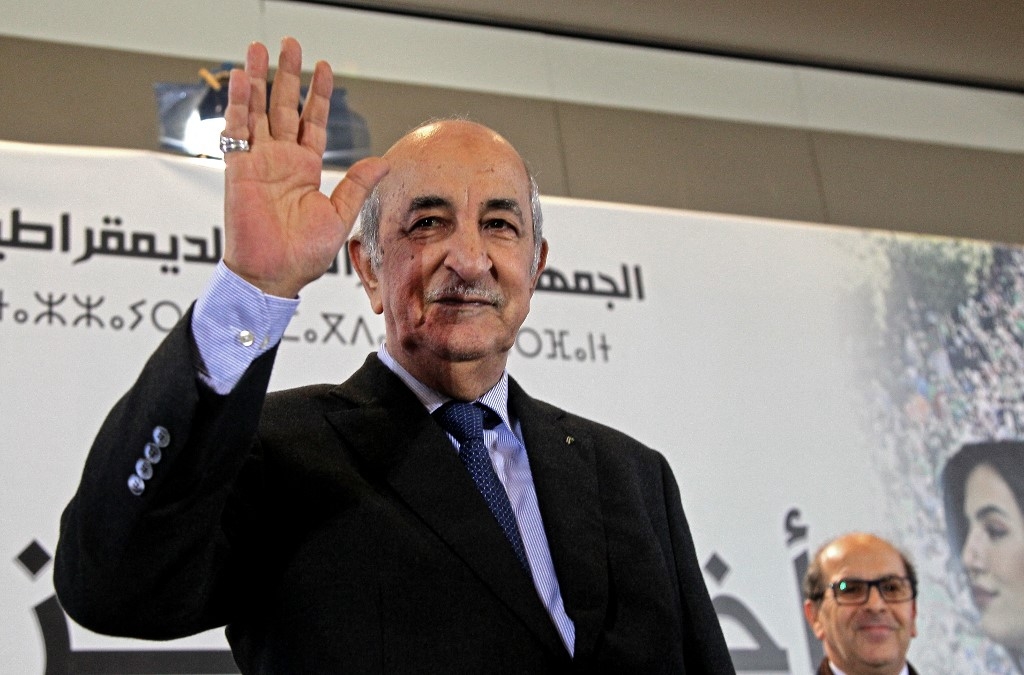
After months of waiting, the National Independent Authority for Elections (ANIE) has published the list of candidates authorised to compete in the Algerian presidential election scheduled for 7 September.
The current head of state, Abdelmadjid Tebboune, will face Youcef Aouchiche, the secretary general of the Socialist Forces Front (FFS), and Abdelaali Hassani Cherif, the president of the Movement of Society for Peace (MSP).
Thirteen candidates were disqualified from the race, many of whom are relatively unknown to the general public. Most were eliminated for failing to collect the required number of sponsorship signatures mandated by electoral law.
Collecting these signatures is often a daunting task for would-be candidates. They must gather signatures from 600 elected officials or 50,000 voters, evenly distributed across 29 states.
Among the rejected candidates is Zoubida Assoul, chairwoman of the Union for Change and Progress (UCP) and a former magistrate known for defending imprisoned activists from the Hirak movement, the widespread popular uprising that led to the downfall of long-time autocrat Abdelaziz Bouteflika in April 2019.
New MEE newsletter: Jerusalem Dispatch
Sign up to get the latest insights and analysis on Israel-Palestine, alongside Turkey Unpacked and other MEE newsletters
Naim Khemmar, an activist in Assoul's party, explained on Facebook that based on his experience in the state of Oum el-Bouaghi, one of the main obstacles to collecting signatures was "citizens’ fear of the consequences of signing for a candidate opposed to the government, especially since the signature has become digital".
Another disqualified candidate, Saida Neghza, the president of the General Confederation of Algerian Enterprises (CGEA), accused the electoral body of "fraud" and announced plans to file an appeal.
Her plea, along with those of other potential candidates, was rejected by the Constitutional Court.
Just days after the ruling by Algeria's highest judicial authority, three would-be contenders - Neghza, Belkacem Sahli, a former minister under Bouteflika, and Abdelhakim Hamadi, an independent pretender - were placed under legal supervision, accused of having "purchased signatures of sponsor".
A president and two-bit players
The rather important number of would-be candidates does not accurately reflect the reality of the political situation in Algeria.
Political parties, journalists and activists complain of a complete closure of the political and media space.
While only the head of state and officials are granted access to major media outlets, dozens of legal proceedings and jail sentences have been imposed on a range of citizens, sometimes for merely posting on social networks.
In July, Amnesty International said: “Over the past five years, Algerian authorities have escalated their clampdown on the rights to freedom of expression and peaceful assembly by targeting dissenting voices, whether they are protesters, journalists or people expressing their views on social media.”
‘The problem is that for many Algerians, the result of the election is known in advance. Everyone knows the winner’
- Nacer Djabi, professor of political sociology
“Hundreds of people have been arbitrarily arrested and detained. Dozens of peaceful protesters, journalists, activists, and human rights defenders continue to languish behind bars for criticizing the authorities,” the rights group also said in February in a report marking the fifth anniversary of the Hirak.
This widespread repression has stifled the political landscape, discouraging many Algerians from venturing into the political arena despite the tremendous popular mobilisation that pushed Bouteflika to resign five years ago.
As a result, the upcoming election is expected to hold few surprises.
"The three candidates in the presidential election reflect broadly three ideological tendencies of the Algerian society," Nacer Djabi, a professor of political sociology, told Middle East Eye.
The frontrunner is the current president of the People's Democratic Republic of Algeria.
Abdelmadjid Tebboune, 79, presents himself as an "independent candidate", but he is, in reality, backed by political parties and "civil society" groups that supported the ousted president, Bouteflika.
These political formations belong to the "nationalist and conservative" faction in the country, including the National Liberation Front (FLN), the former single party that emerged from the war of independence against France, the National Democratic Rally (RND), established in 1997 by government officials to support the ruling elite, and the El Bina Movement, a party inspired by the Muslim Brotherhood that now identifies as nationalist.
Their support has enabled Tebboune, who is nearing the end of his five-year term that began in December 2019 following a controversial election, to gather an impressive number of signatures from citizens and local elected officials.
The incumbent president has emphasised that his platform primarily focuses on "the continuation" of his current programme.
Opposing him is Youcef Aouchiche, 41, the youngest candidate in this presidential election. For the past three years, he has served as the secretary general of the FFS, the oldest opposition party in Algeria.
A former journalist, Aouchiche has been a member of the Senate, the upper house of the parliament, since 2022. Although his political experience is limited, his youth is seen as an asset, according to political analyst Laid Zeghlami, who told MEE that Aouchiche “will be able to weigh in the political game in the future".
For several years, his party has been labelled as "responsible opposition" by many actors, particularly those close to the political establishment, who want to distinguish it from other, more “radical” opponents.
In his speeches, Aouchiche has promised to "put politics back" at the heart of Algeria’s public scene and open up "the political and media fields".
From the government's perspective, Aouchiche's participation aims to push his stronghold, Kabylia - a rebellious, Tamazight-speaking region that did not vote in the 2019 presidential bid - to head to the polls in September, thereby avoiding another massive boycott.
The third candidate, Hassani Cherif, 57, is less known to the general public. He has been the president of the MSP, an offshoot of the Egyptian Muslim Brotherhood, formerly known as Hamas, since 2023.
A lawmaker between 2007 and 2012, Hassani Cherif's political experience is relatively short. However, he can rely on the local structures of his party to campaign, particularly around the "values" of Algerian society.
On Sunday, Hassani Cherif announced that his platform aims to "consecrate the components of national identity and crystallise a vision of global and sustainable development capable of mobilising human and material capacities, achieving self-sufficiency, strengthening the structure of society and involving all Algerians in the development and prosperity of the country".
Hassani Cherif's candidacy came as a surprise to observers of the Algerian political scene. His predecessor, Abderrazak Makri, 61, was widely considered the most suitable candidate for the movement.
Makri had been preparing for this election for many months, and he is known for his charisma and influence in Algeria and certain circles around the world.
However, to everyone's surprise, the MSP prevented militants from potentially selecting Makri as the presidential candidate, announcing that only the party chairman could run the race and blocking the party’s consultative body from voting for another contender.
Concurring sources said this decision was influenced by pressure from the authorities, who did not want this popular personality to challenge Tebboune.
Before being barred from running for president, Makri was banned from leaving the country at the end of last year without any explanation. This travel ban has since been lifted.
A moribund campaign
The upcoming presidential race in Algeria has sparked little interest from the media, the political class or the general public.
With the election just a month away and the campaign officially beginning on 15 August, there is a noticeable lack of political activity and election-related TV programmes are scarce, if not entirely absent.
"The problem is that for many Algerians, the result of the election is known in advance," Djabi told MEE.
"Everyone knows the winner", he added, referring to the incumbent president.
‘This election is a solution for the political regime but not for Algeria. The two other candidates are only there to act as guarantors’
- Ismail Maaraf, political scientist and lawyer
No one in Algeria believes that Tebboune's two opponents can cause any surprise or even impact the abstention rate, which is seen as the only real issue in Algeria’s electoral life.
While some observers, such as Zeghlami, attribute Tebboune's dominance to his "experience", others, such as Djabi, criticise the "closure of the political and media scene".
This situation has led some political parties to boycott the election altogether.
Jil Jadid, an opposition party, announced that with "a second term for the current president is de facto imposing itself", it would be more productive to focus on the next elections, particularly the legislative polls scheduled for 2026.
The secular opposition party Rally for Culture and Democracy (RCD) has also decided not to participate in the race, saying that "the conditions for a regular election" were not met.
The RCD specifically called for the "release of detainees" and the establishment of a "truly independent" electoral body.
Like many parties, the RCD believes that the National Independent Authority for Elections is too closely aligned with the current government. As evidence, some observers note that the electoral body did not reprimand Tebboune when he appointed his interior minister as campaign director, despite the fact that the ministry oversees the logistics of the elections.
The RCD condemned this move in a press release, stating that with this decision, "the discredit that hits this election turns into provocation".
According to political scientist and lawyer Ismail Maaraf, the vote is “a solution for the political regime but not for Algeria”.
The two other candidates are only there to act as “guarantors” of a facade of democracy, while the outcome of the election is already a foregone conclusion, he told MEE.
While some analysts have praised the emergence of new political figures, such as Aouchiche and Hassani Cherif, social scientist Nacer Djabi laments that “political parties are incapable of producing new elites”, as the same politicians have occupied the scene for decades.
The key question now is whether Algerians will actually cast their ballots. Less than 40 percent of voters participated in the last presidential election in December 2019 amid the political turmoil sparked by the Hirak.
Many believe that due to the scorching heat, the start of the school year and the tense political situation in the country, many Algerians will once again give the polling stations a wide berth.
Middle East Eye delivers independent and unrivalled coverage and analysis of the Middle East, North Africa and beyond. To learn more about republishing this content and the associated fees, please fill out this form. More about MEE can be found here.


